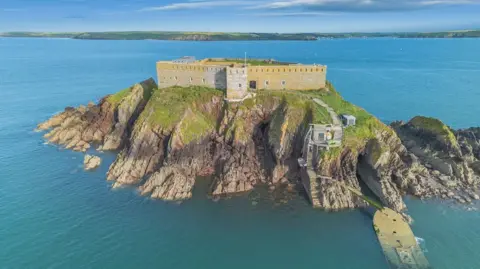**A Revitalized Landmark: Thorne Island’s Transformation**
Thorne Island, once an abandoned 19th-century Napoleonic fortress, has undergone a remarkable renovation, giving it a new lease on life as a party island valued at £3 million. The transformation story begins with Mike Conner, a former software company CEO, who took on the challenge of rejuvenating this derelict landmark. The island, located near Milford Haven in Pembrokeshire, was purchased in May 2017 for £555,000—a sum that was just the tip of the iceberg, given the scale of work required.
Initially, Conner faced more hurdles than he had anticipated. The fortress had sat empty for 17 years prior to his purchase, and it had fallen into disrepair. In its earlier days, it was known for hosting vibrant parties under its previous ownership, but now, it lacked basic amenities such as running water. After a grueling year of renovations, the fort was returned to a habitable condition, now boasting 40 beds, four en-suite bathrooms, and even its own nightclub.
The rejuvenation journey of Thorne Island is not merely a tale of bricks and mortar; it is also a reflection of Conner’s personal challenges and aspirations. He humorously remarked on the endeavor, stating, “Many have described it as a midlife crisis.” The renovation process took nearly five years, during which six men resided on the island continuously, facing the unique challenges associated with working on a remote site.
Conner’s insights about the fort are steeped in appreciation for its history. Designed to serve as a defensive structure in the 1850s against French naval attacks, the fort was converted to a hotel in 1947 and was rented out for various occasions, including birthdays, weddings, and stag parties. However, after falling into disrepair, it was sold in 1999 and left largely abandoned until Conner’s purchase.
During his renovation process, Conner faced enormous logistical challenges, with materials often being transported in via helicopter—a physical testament to his commitment and vision. “Getting materials was extremely difficult,” he noted, acknowledging the hard living conditions that his workers endured. They would often go for weeks without proper amenities, relying on generators to charge their phones and taking sea dips to stay clean.
Despite these hardships, the project became a bonding experience for the team involved. “Most people who joined the project, I still work with now,” Conner reflected, indicating a strong camaraderie developed during those challenging times.
As a design and technology teacher turned entrepreneur, Conner found the design aspect of the renovation particularly compelling. Inspired by the original Victorian architecture, he endeavored to blend modern amenities with the historic structure’s impressive features. Thorne Island has seen a variety of events since its reopening—from serene retreats to lively 80-person parties.
As the renovation drew to a close, the island began to serve not only as a weekend getaway but also as a venue for eccentric celebrations, including a personal festival for Conner’s 50th birthday, featuring performances and themed decorations. “People who come for a weekend are surprised when I hand them a bin liner and say it needs to come back off with them – but no one comes here to collect the bins,” he humorously described the self-sufficient ethos that comes with island life.
Looking to the future, Conner envisions a full-scale reopening that could potentially attract 800 visitors at a time and transform into a significant tourist attraction. With the right ownership, he believes Thorne Island can fulfill its potential not only as a destination for parties but also as a beacon for preserving Welsh heritage. Conner’s journey of renovation invites the next owner to dream big about the fortress’s capabilities while appreciating the immense history it carries.
In conclusion, Thorne Island stands as a testament to resilience, creativity, and the impact of conscientious restoration efforts. By embracing both its storied past and future possibilities, the island embodies the spirit of innovation and revitalization that can breathe new life into even the most neglected of spaces. As the story of Thorne Island unfolds, it serves as a win-win narrative for nature, history, and community.












